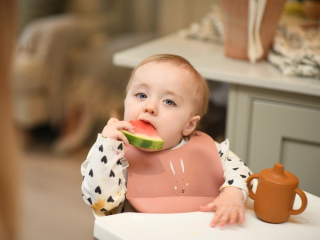
- Home
- Advice Hub
- Toddler
- Toddler Feeding
- Switching Your Toddler's Milk
Switching your toddler's milk
When your little one gets to a year old, you can make the decision to move them onto cows' milk. In this article our Paediatric Dietitian guides you through this transition.
What happens with milk?
When your baby gets to a year old you can start to think about what you are going to do with their milk. You don’t have to switch to cows’ milk if you want to continue breastfeeding or to stay on formula for a while longer, that’s fine. However, even if you decide not to fully switch, it is good to get your little one used to the taste of cows’ milk with a cup or a few sips here and there so that they get used to the taste. (Remember, at some point you will be switching so it’s good to prepare for the future).
Will my baby tolerate cows’ milk?
Some people worry that their baby isn’t going to tolerate cows’ milk. It is unusual for a baby that has been consuming milk in food or drinking formula to have any negative side effects of switching onto cows’ milk.
If your baby becomes constipated during weaning or has loose stools, you may find people blaming the cows’ milk that you’ve been giving. In reality, it’s more likely to just be your baby’s gut adjusting to all the different foods they’re being given, and in particular the fibre. Try not to jump to conclusions and start cutting things out. Give it a bit of time to see what happens. You are likely to find that it settles down and goes back to normal (or a new normal, but one that doesn’t involve constipation or explosive poos!).
Making the switch
If you are switching over, there’s no right or wrong way to do it. Most babies are fine to simply switch like for like – whatever volume of infant milk you are giving you can replace it with the milk you are moving onto. Others find it a little more difficult as the taste will be different, so if you notice your baby struggling you can do a slower and more gentle change over. Depending on how difficult your baby is finding the switch you could do any of the following:
- Half and half: replace half of your baby’s usual milk with the new milk for a few days then replace all.
- Thirds: replace a third for a few days, then another third and then finally all the milk will be the new milk.
- Ounce by ounce: replace one ounce of milk and then every few days replace another ounce until all your baby’s milk is the new milk you want them to be on.
Go as quickly or as slowly as you need to, this is one of those areas where you should be totally led by your baby.
How much is enough?
By 12 months, solid food should be the primary source of nutrition, with three meals a day being taken and moving towards a couple of nutritious snacks in between meals. Milk is still an important part of the diet and provides some essential nutrients such as calcium and iodine. However, as milk is likely to impact the appetite for solid food and there are links between large milk intakes and iron deficiency anaemia, getting the balance right is important too.
If, like many babies, your little one eats yoghurt and cheese everyday they actually only need around 100ml of milk to drink. In reality, most babies are having more than that! Try to avoid giving more than 400ml to drink each day, which is the equivalent of a full bottle twice a day.
What if my baby doesn’t like drinking milk?
If your baby is over a year and doesn’t like drinking milk but is eating yoghurts and cheese then you don’t need to worry too much. A matchbox size piece of cheese and a pot of yoghurt is enough to meet their calcium needs.
If your baby refuses any kind of dairy, has an allergy, or you are voluntarily plant based, you can get calcium in the diet from other sources such as fortified cereals and breads, ground almonds, tinned fish with bones and dark green vegetables such as broccoli or kale. Whilst some of these foods are good sources, it is good to check in with a dietitian if you are completely milk- free to see whether you need to be giving a calcium supplement.
Advice & tips

Want to read more? Join the HiPP BabyClub for full access to this article.
As a BabyClub member, you'll get access to a range of exclusive benefits, including:
Monthly competitions
Discounts from our Partners
Expert advice tailored to your little one's age
Weaning recipes
HiPP shop discounts*
*10% off HiPP's online shop does not apply to our First Infant, Anti-Reflux or Comfort Formula Milk.
Important notice: Breastfeeding is best. Follow on milk should only be used as part of a mixed diet from 6 months. Talk to a healthcare professional.












